Misyon Online - March-April 2012
Pulong ng Editor
Minister Bhatti, you forgot one question in the interview. Your life is threatened by who and what sort of threats are you receiving?
The forces of violence, militant banned organizations, the Taliban, and Al Qaeda, they want to impose their radical philosophy on Pakistan. And whoever stands against their radical philosophy that threatens them, when I’m leading this campaign against the Sharia Law, for the abolishment of (the) Blasphemy Law, and speaking for the oppressed, marginalized and persecuted Christian and other minorities, these Taliban threaten me.

A Path to Life
By Fr Peter Woodruff
Fr Noel O’Neill was ordained in Ireland in December 1956 and has been working in Korea since 1957. Fr Peter Woodruff is an Australia Columban who worked in Peru for many years. Ordained in 1967, he is now based in Essendon, a suburb of Melbourne, at the headquarters of the Columbans in Australia and New Zealand.
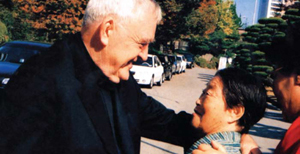 Columban Fr Noel O’Neill, spoke to the staff of our mission office in Essendon, Melbourne, Australia, about his experience with intellectually disabled people in Korea. Father Noel arrived in Korea in 1957, not long after the Korean War ended in 1953. The whole country had been devastated by war and was still in the throes of reconstruction. Like most Columbans at that time in Korea, Father Noel began his mission work building up and running parishes; this was his mission for 24 years.
Columban Fr Noel O’Neill, spoke to the staff of our mission office in Essendon, Melbourne, Australia, about his experience with intellectually disabled people in Korea. Father Noel arrived in Korea in 1957, not long after the Korean War ended in 1953. The whole country had been devastated by war and was still in the throes of reconstruction. Like most Columbans at that time in Korea, Father Noel began his mission work building up and running parishes; this was his mission for 24 years.

By Fr Joseph Panabang SVD
Decision on Complexion
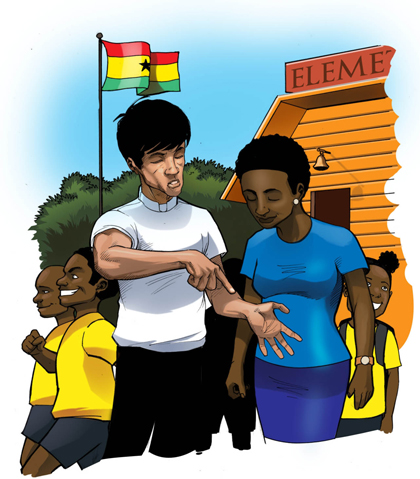
Out of idle curiosity, one village teacher wanted to know why I had chosen Ghana as my mission. I replied, ‘When I was asked to choose, I looked first at my skin, thought of Ghana, and told myself that I must go to a place where I will be easily inculturated by color’.

A Vicious Cycle of Destruction
By John Din, Columban Lay Missionary
John Din, from San Miguel, Zamboanga del Sur, is the Coordinator of Columban Lay Missionares – Philippines, a position he took last year after spending almost 18 years as a Columban Lay Missionary in Brazil and Peru.

First Taste of Mission
By Tavite Tukutukubau
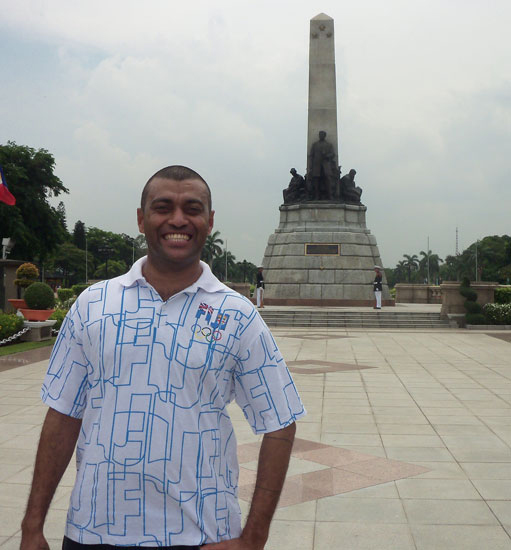
The first journey in one’s missionary life is exciting and wonderful.
As a young boy growing up in a Fijian village I used to admire big planes flying over us especially at night. Every night I used to look forward to admiring the level of technology we’ve reached.

Fiji Day in Manila
By Pat Visanti
On 7 October we had an anticipated celebration for Fiji Day at our formation house in Cubao. For me, celebrating Fiji Day away from home for the first time in my life was a touching and memorable experience.
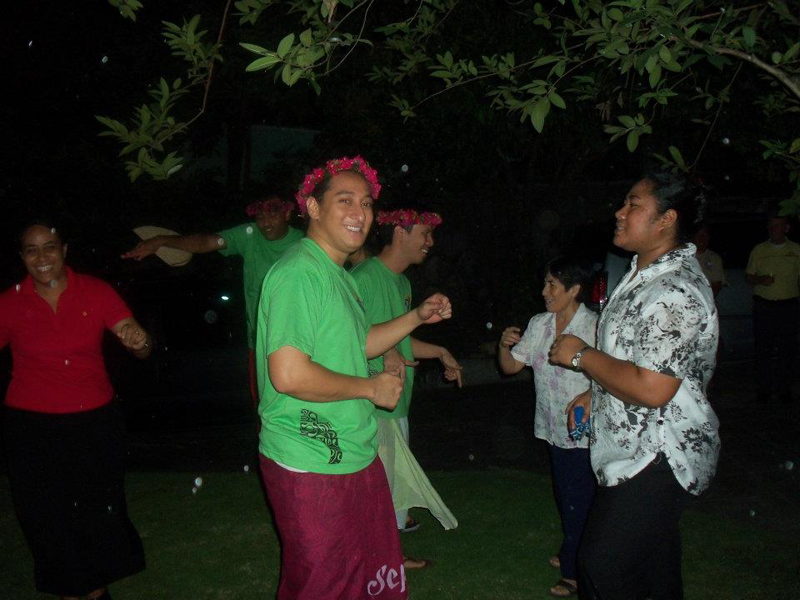
We began with a Mass celebrated by Fr Arthur Ledger SJ, Fiji’s only Jesuit priest, who is the current director of the East Asia Pacific Institute at Ateneo de Manila. Then followed the Fijian kava ceremony. We also had a brief slide-show of the history of Fiji. The spiritual year students performed the meke, a traditional Fijian dance, and this was followed by the meal. The night was simply the Pacific at its best here in Manila, and there was more than enough for everyone who came to join us in our celebration.

Organic Culture
By Fr Brian Gore
Fr Brian Gore, from Western Australia, was ordained in 1968 and then came to the Philippines, where he was assigned to the southern part of Negros Occidental, at that time in the Diocese of Bacolod but since 1987 the Diocese of Kabankalan, an area where the Columbans have worked since 1950.
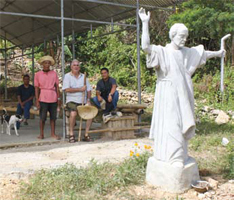
We are promoting a programme of subsistence farming in the parish of Oringao, in the mountainous hinterlands of Kabankalan City, Negros Occidental, where I worked from 1975 to 1984. I no longer work as parish priest but coordinate any parish related matters with the present parish council. In the old days we were able to organize rallies of up to 10,000 community members determined to protest against abuses by the military, government officials and landlords. We were seen by the Marcos regime as a threat to established power. Seldom before on Negros Island had the poor found a way to stand up to the wealthy and powerful.

Street Children Locked Up
By Fr John A. Keenan
Fr Keenan, from Ireland, is chaplain at Centro Escolar University Manila.
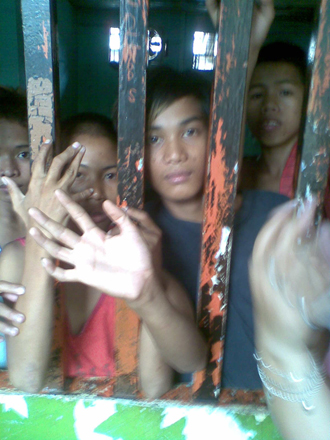
Maria dela Cruz, 15, and Lourdes Garcia, 16, (not their real names) were abducted one night near their homes and taken to a detention center near Manila City Hall because of ‘bagansa’, vagrancy, ie, being out during curfew. Instead of being taken home to their parents they were dumped into an already overcrowded, poorly ventilated detention center called ‘Reception and Action Center’ (RAC). Most children do not know what curfew is and anyhow they do not have watches or know how to observe the curfew hours. The plight of such children abducted from the streets was highlighted a couple of years ago in the local and international media. It is estimated that there are up to 20,000 children behind bars in the Philippines.

What is the meaning of Lent?
Here Fr Tom O’Reilly, the Regional Director of the Columbans in Britain, offers some answers arising from an experience in Pakistan.
There's a crack in everything and the light gets in
When I arrived at a small chapel on the outskirts of Gujranwala, Pakistan, to celebrate Mass on the first Sunday of Lent I was surprised to see the place was practically empty. Eventually, I was told that the people were assembled in the house of Rashid, a parishioner, to support him in the rigorous fast he had begun on Ash Wednesday.

Misyon Really Inspires Me!
By Maricar Garces
Misyon really inspires me.
I’m very sad to hear that you are no longer printing the magazine! I've been searching for you all over the internet and am very interested in being a member! I love reading stories from your Columban missionaries because they inspire me a lot! I feel that our Lord is beside me when I read these articles! I’ve kept a copy of the March-April 2002 issue of Misyon,. Even though it’s not the latest, the stories refresh me each time I read them. It’s very inspiring.
Right now, I’m a happy mom . . . no, no let me correct that . . . I’m a super happy mom! My son is such a wonderful blessing even though he sometimes likes to bite on the magazine that I’ve been keeping for a long time now.

Weaving a Dream
By Mercy B. Gawason

The author is a young Subanen who works with Subanen Craft.. She and her companions at Subanen Crafts recently visited Negros Occidental and dropped by the Misyon editorial office in Bacolod City.
There’s no easy way for the poor to reach their dreams. They have to work and sacrifice for it. There are lots of thorns and obstacles that you can encounter but if you really want to achieve your dreams in life, then you'll find your own strategy. No matter how difficult it is you must go on. As they say, poverty is not a hindrance to success. Never forget where you have come from and always remember decisions you've made because you’ve put God first in all things and believe that with God nothing is impossible.

Pulong ng Editor
Minister Bhatti, you forgot one question in the interview. Your life is threatened by who and what sort of threats are you receiving?
The forces of violence, militant banned organizations, the Taliban, and Al Qaeda, they want to impose their radical philosophy on Pakistan. And whoever stands against their radical philosophy that threatens them, when I’m leading this campaign against the Sharia Law, for the abolishment of (the) Blasphemy Law, and speaking for the oppressed and marginalized, persecuted Christian and other minorities, these Taliban threaten me.
But I want to share that I believe in Jesus Christ who has given his own life for us. I know what is the meaning of (the) Cross and of following the Cross and I am ready to die for a cause. I’m living for my community and suffering people and will die to defend their rights. So these threats and these warnings cannot change my opinion and principles. I will prefer to die for my principle and for the justice of my community rather to compromise on these threats.’
+++
Columbans were first assigned to Pakistan in 1978 and have been there since.
A Path to Life
By Fr Peter Woodruff
Fr Noel O’Neill was ordained in Ireland in December 1956 and has been working in Korea since 1957. Fr Peter Woodruff is an Australia Columban who worked in Peru for many years. Ordained in 1967, he is now based in Essendon, a suburb of Melbourne, at the headquarters of the Columbans in Australia and New Zealand.
 Columban Fr Noel O’Neill, spoke to the staff of our mission office in Essendon, Melbourne, Australia, about his experience with intellectually disabled people in Korea. Father Noel arrived in Korea in 1957, not long after the Korean War ended in 1953. The whole country had been devastated by war and was still in the throes of reconstruction. Like most Columbans at that time in Korea, Father Noel began his mission work building up and running parishes; this was his mission for 24 years.
Columban Fr Noel O’Neill, spoke to the staff of our mission office in Essendon, Melbourne, Australia, about his experience with intellectually disabled people in Korea. Father Noel arrived in Korea in 1957, not long after the Korean War ended in 1953. The whole country had been devastated by war and was still in the throes of reconstruction. Like most Columbans at that time in Korea, Father Noel began his mission work building up and running parishes; this was his mission for 24 years.
He was working in Kwangju when he began to go to the Mudeung Institution which gave support to needy and marginalised people. He soon saw that the intellectually disabled were not able to fend for themselves so he began to sit and chat with them. They were definitely the forgotten ones of Korea in those days. Many would have been left to die at birth and those who survived would be kept hidden by their families, who were embarrassed by their very existence.
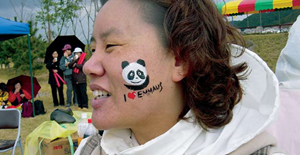 One day Father Noel was called to the hospital to visit You Ha, a young intellectually disabled woman from the Mudeung Institution, who was quite ill. She looked up at him, her eyes bright and clear, and said, ‘Kamsahamnida’ (thank you) and breathed her last. Since You Ha had no immediate family members the hospital intended to use her body for medical research but Father Noel, on learning this, opted to take charge of her funeral arrangements and give her a decent Christian burial.
One day Father Noel was called to the hospital to visit You Ha, a young intellectually disabled woman from the Mudeung Institution, who was quite ill. She looked up at him, her eyes bright and clear, and said, ‘Kamsahamnida’ (thank you) and breathed her last. Since You Ha had no immediate family members the hospital intended to use her body for medical research but Father Noel, on learning this, opted to take charge of her funeral arrangements and give her a decent Christian burial.
Each year, at the time of the harvest festival, he visits her grave. In her dying moments she had shown him a path to life. Father Noel became increasingly involved with the intellectually disabled and won support from the Columbans and the local bishop to dedicate himself full-time to working with them. He also met opposition from Columbans who did not approve of any priest leaving the parish mission to do some kind of social work. Koreans also had serious reservations about a priest doing such work because for them the intellectually disabled were no more than an unfortunate and most embarrassing phenomenon that was basically the result of evil spirits (Shamanism) or a bad life in a previous existence (Buddhist idea of reincarnation). Then there was the Confucian idea that humans were either wise or stupid and of course the intellectually disabled were extremely stupid.
Clearly solidarity with the intellectually disabled was not merely about being with them, giving them a hand and making friends with them. The attitudes of all sectors of society needed to be challenged and transformed. The challenge of love was to find ways to transform the social milieu so that the intellectually disabled might be able to feel part of society, not shunned and shut away as an embarrassment to all.

Father Noel travelled to Australia to look for ideas. Columban Fr Peter Toohey introduced him to L’Arche in Sydney and urged him to go to Canada to experience living in one of Jean Vanier’s L’Arche communities there. His eyes were opened by the way volunteers treated with profound respect the intellectually disabled people. It was for him like the experience of the two disciples on the road to Emmaus when their eyes were opened as they broke bread with the stranger who had joined them along the road. They showed him how precious is the dignity of the human person who has been devalued by society.
The major challenge was to change people’s mentality. Even the Church leadership was supporting policies to maintain the intellectually disabled in isolation. The basic strategy for change was to get the intellectually disabled out of isolation as regards housing, work, cultural activities and social life. By mixing with others the intellectually disabled would change the way they were perceived, so the intellectually disabled themselves were to be the key to changing entrenched social attitudes.
Father Noel has found support from many quarters, government, religious organisations, other institutions and individuals. With this support he has been able to bring the intellectually disabled out of isolation, to live in apartment blocks with the rest of the community, to work alongside others who are not disabled, to participate in religious communities, to produce beautiful products that are exhibited and sold in public places. He has successfully challenged the accepted wisdom of keeping ‘them’ hidden; he has made ‘them’ visible. He states clearly that for all this to begin to happen all that is required is that we respond positively to the one question that intellectually disabled people ask us: ‘Do you love me? Will you come out to a meal with me? Will you take a walk with me? It’s the fundamental question of the gospel, Do you love me?’
A Vicious Cycle Of Destruction
By John Din, Columban Lay Missionary
John Din, from San Miguel, Zamboanga del Sur, is the Coordinator of Columban Lay Missionares – Philippines, a position he took last year after spending almost 18 years as a Columban Lay Missionary in Brazil and Peru.
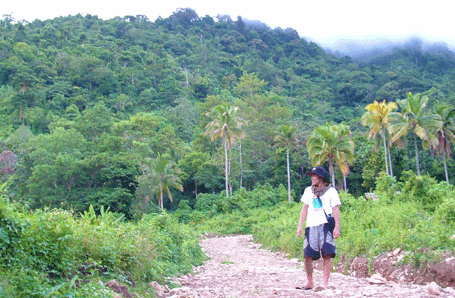
First there was the forest, then the loggers came; bare lands appeared and mining companies came. What next? This idea was on my mind when I revisited Midsalip in January 2011 to make a short video on the struggle of the indigenous Subanens and the people of Midsalip, Zamboanga del Sur against mining. My first visit to Midsalip was in the 1987 together with a group from our parish during the picket against logging companies. This visit and the participation in the picket at an early age has been the most educative experience about the care of environment in my life.
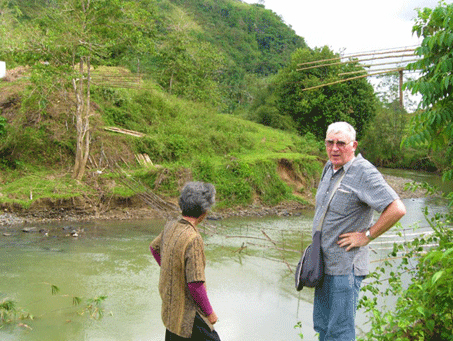
I attended the court hearings in Aurora and Pagadian City and met with all the accused, among them the Subanen leaders, Columban Sister Patty Andonaire from Peru and Columban Fr Sean Martin from Ireland. The mining company had filed a criminal and civil case against them.
I spent a night in the picket area in Guinabot, Midsalip, and interviewed Ricardo Tolino, one of the Subanen leaders and respondent to the case. The fruit of this interview is the video Pagmina o Kasiguroan sa Pagkaon ug Kaugmaon? (Mining or Food and Future Security?).
InJuly the Mining Company managed to get a Temporary Restraining Order that forced the picketers to abandon the proposed mining area. The drilling has started. The struggle now is to support the Writ of Kalikasan for the Zamboanga Peninsula.
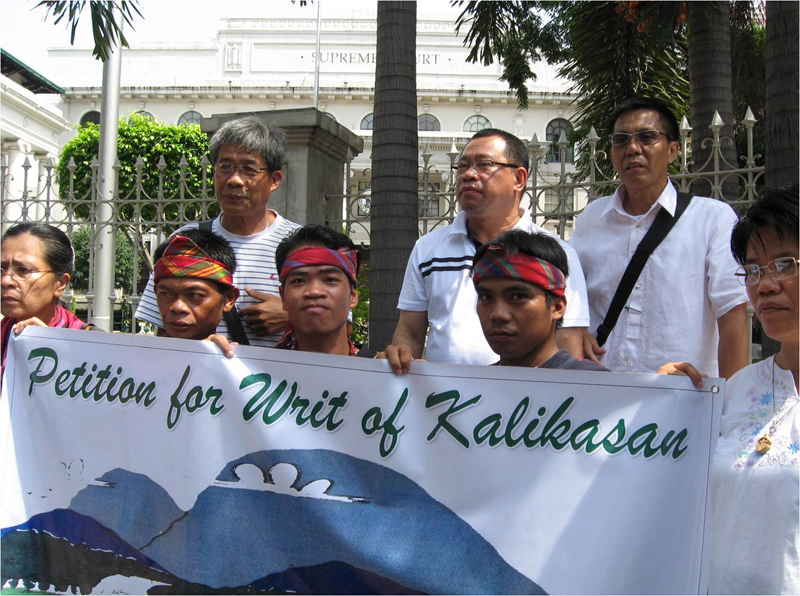
The Writ of Kalikasan is defined by the Supreme Court as a ‘remedy available to a natural or juridical person, an entity authorized by law, people’s organization, non-governmental organization, or any public interest group accredited by or registered with any government agency, on behalf of persons whose constitutional right to a balanced and healthful ecology is violated, or threatened with violation by an unlawful act or omission of a public official or employee, or private individual or entity, involving environmental damage of such magnitude as to prejudice the life, health or property of inhabitants in two or more cities or provinces’. (Rules of Procedure for Environmental Cases A.M. No. 09-6-8-SC Rule 7, Sec. 1)
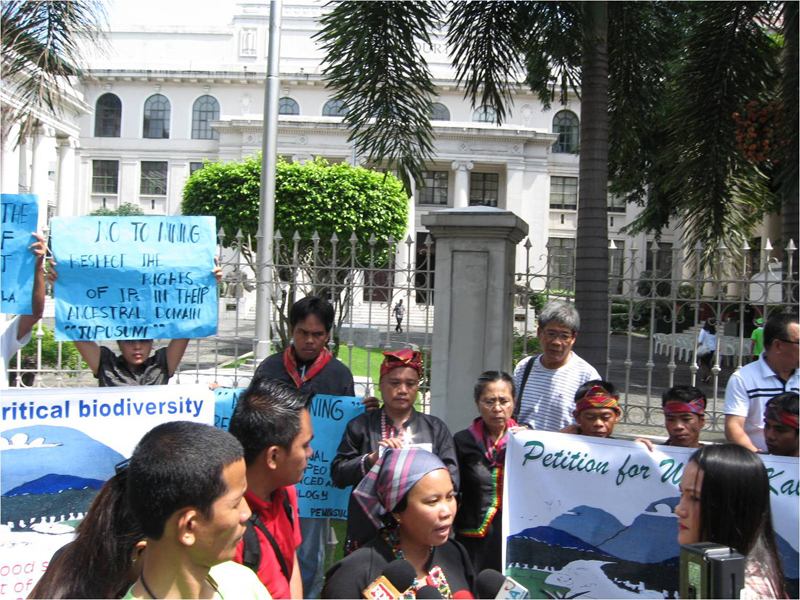
I was assigned for seven years in Brazil and eleven in Peru. Both of these countries have gone through the same pattern of destruction, first sending people to large areas of virgin forest, then come the loggers, the cattle ranchers and, finally, the mining companies. Forests were denuded at tremendous speed, driving the indigenous people to death and to nowhere. After the timber was cut, the vicious cycle continuous; greedy corporate interest to minerals, digging open pit mines, rerouting, contaminating and killing rivers. A desolate land, dried rivers, tons of poisonous mercury and cyanide were left to replace what were once lungs of the earth.
Amidst this destruction, human communities continue to produce unknown martyrs in defense of the forest and the indigenous people, among them Chico Mendes, murdered in 1988, and Sr Dorothy Mae Stang SND in 2005.
Returning to the Philippines after almost 18 years of being away as a Columban Lay Missionary I can see the Philippines hasn’t escaped from this pattern of ‘development’. Mining companies have spent millions in propaganda to present what they do as responsible ‘clean’ mining, hiring private security guards, bribing, it is alleged, national and local government officials to promote their interests. The Philippines has produced many martyrs too, including journalists, NGO leaders, priests and religious and lay people.
You may email John Din at clmssc_phil@yahoo.com
Orignal: http://columbanlaymissionaries-philippines.blogspot.com/2011/11/vicious-cycle-of-destruction.html
Father Joeker
By Fr Joseph Panabang SVD

Decision on Complexion

Out of idle curiosity, one village teacher wanted to know why I had chosen Ghana as my mission. I replied, ‘When I was asked to choose, I looked first at my skin, thought of Ghana, and told myself that I must go to a place where I will be easily inculturated by color’.
Royal Taster
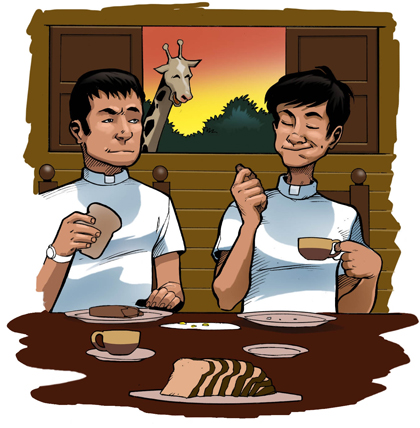
Fr Augustine Villanueva SVD from Baguio City, our Acting Provincial Superior stopped at Kintampo. During breakfast, we were not sure whether the cheese was still good or not. ‘Let me taste it first,’ I said. I took first one piece, then another, bigger piece at which Father Gus asked, ‘And what is that second piece for?’ ‘The first was to taste it; the second was to confirm that it was OK’. Seeing how much the cheese had diminished, he raised an unbelieving eyebrow.
City Man
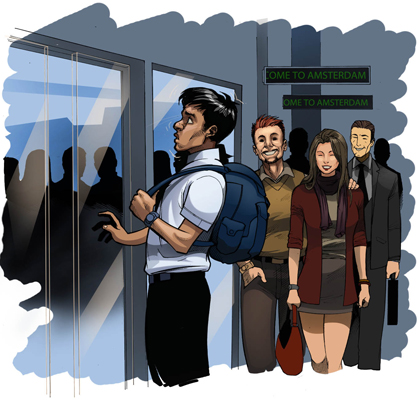
Schiphol Airport, Amsterdam. To give the impression that I too was a city man, I walked proudly and with confidence toward the door. Suddenly it opened automatically. Frightened, I jumped backward, my bag dangling on my back. I looked around and saw people laughing and nodded to them, apologizing with a smile, ‘Forgive the bush man from Africa’.
Beware of Fr Joeker
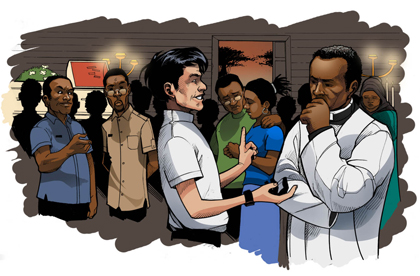
The mother of Archbishop Dominic Kodwo Andoh, at the time Archbishop of Accra, had died. I happened to be at the funeral and the preacher gave an excellent homily on death that really made the audience, almost hypnotized, hang on every word he said. After the Mass, in the sacristy while the priests were removing vestments and exchanging comments, the preacher passed right in front of my nose and I remarked, ‘Father, that was indeed a death-stirring homily.’ Someone at the back responded, ‘Beware, he (pointing at me) is a joker.’
Fiji Day In Manila
By Pat Visanti
On 7 October we had an anticipated celebration for Fiji Day at our formation house in Cubao. For me, celebrating Fiji Day away from home for the first time in my life was a touching and memorable experience.

We began with a Mass celebrated by Fr Arthur Ledger SJ, Fiji’s only Jesuit priest, who is the current director of the East Asia Pacific Institute at Ateneo de Manila. Then followed the Fijian kava ceremony. We also had a brief slide-show of the history of Fiji. The spiritual year students performed the meke, a traditional Fijian dance, and this was followed by the meal. The night was simply the Pacific at its best here in Manila, and there was more than enough for everyone who came to join us in our celebration.
When we sang a Fijian hymn, Sa kau cake mai oqo, at the offertory of the Mass, my memory drifted back home where people wake up early in the morning to prepare the lovo, an earth oven, for the traditional way of cooking. The aroma of cooked pork, chicken and palusami filled my mind. I could also picture families along the beach at Nasese enjoying the day with kava, Fiji’s number one tropical root drink.
As for us here in Manila, our small celebration was more than we could have asked for in commemorating this very important day with Fijian citizens back in Fiji and around the world. The preparations for the celebration went on from Monday to Friday, the actual day of the celebration involving a lot of cleaning and especially preparing the food. We are a team of seven in the spiritual house, four students, two formators, Frs Michael Mohally and Brendan Kelly, and Joy, our hard working cook. Each had a role to play.
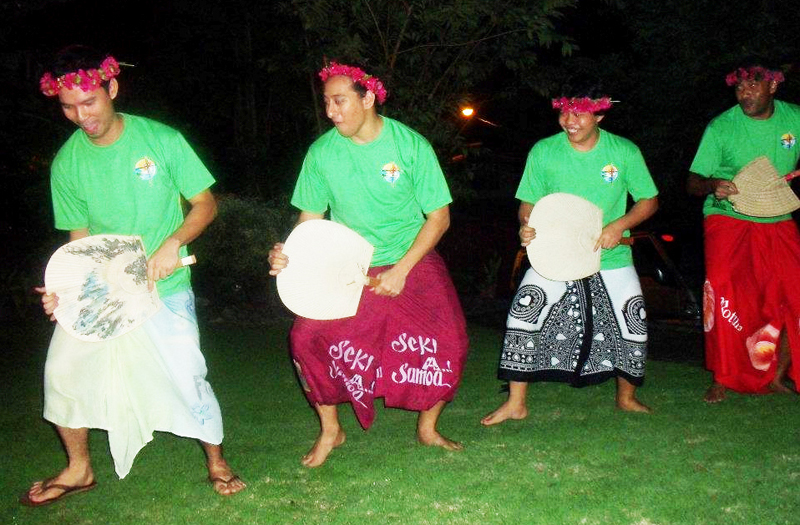
We may be a thousand miles away from home but we are one in heart and spirit with our people in Fiji. This experience of celebrating Fiji Day in a foreign country has made me appreciate who I am and where I come from. I will always be proud of my identity and my culture. You can take a Fijian out of Fiji but you can never take Fiji out of him. No matter how far I travel, I’ll hold my head up high, because Fiji means the world to me. May God bless Fiji forever!
First Taste Of Mission
By Tavite Tukutukubau
The first journey in one’s missionary life is exciting and wonderful.
As a young boy growing up in a Fijian village I used to admire big planes flying over us especially at night. Every night I used to look forward to admiring the level of technology we’ve reached.

Tavite at Luneta, Manila
But on 9 May 2011 my dream was fulfilled by getting into a Korean Air Airbus on my way to the Philippines for my Spiritual Formation Year. My companion, Pat Visanti, and I were to spend three days at the Formation House in Seoul, Korea, before flying to Manila.
Coming from the western side of Fiji where it is hot and dry, the first thing that struck me in Korea was the weather. They said it was spring but coming from a tropical island and this being my first trip overseas, it was really cold for me. Also, the food was totally new but I had to eat it. Otherwise I’d be starving.
As we were making our way to our taxi at NAIA, Manila, my first impression was of the children who came running after us. Then I realized that this was the reality of Manila that I was experiencing.
With all the excitement of being in this country still with me I was eager to experience everything during my first few days. I was anxious to see and to feel everything that I had always heard about this country from others.
After a few days I realized that I was in a country totally different from my own. Loneliness struck and I began to think of home and all the fun they would be having at this time.
After the excitement had gone, I remembered that my main reason for being here was my Spiritual Year. I’m training to be a Columban missionary priest and one important aspect of our life as Columbans is crossing cultures. So a vital factor of my training is living in a culture so different from my own.
What really strikes me is my need to continually develop my personal relationship with my Savior in a new country. That means getting away from my ‘comfort zone’ and developing in a place where I will face challenges in life, especially on my faith journey.
Through the spirituality of St Columban, I will try to develop the values of Christ and to be a witness to others.
In the words of the saint, ‘I live for Christ not for myself . . .’
Tavite Tukutukubau is in his Spiritual Formation Year in Cubao, Quezon City.
Our Hideaway
Weaving a Dream
By Mercy B. Gawason

The author is a young Subanen who works with Subanen Craft.. She and her companions at Subanen Crafts recently visited Negros Occidental and dropped by the Misyon editorial office in Bacolod City.
There’s no easy way for the poor to reach their dreams. They have to work and sacrifice for it. There are lots of thorns and obstacles that you can encounter but if you really want to achieve your dreams in life, then you'll find your own strategy. No matter how difficult it is you must go on. As they say, poverty is not a hindrance to success. Never forget where you have come from and always remember decisions you've made because you’ve put God first in all things and believe that with God nothing is impossible.

This is what I’ve experienced as the daughter of poor parents. I supported myself. I studied as a working student and this was very hard. Things had to be kept in balance, time had to be managed properly and personal matters set aside. There were many times when I was hurt, discriminated against because of my culture and for who I am. There were times when I wanted to give up but I had to pursue my dream so that someday I could make others wake up and realize that judging others is very wrong. That's why I stood up. Life had to go on so I used my heartaches as my challenge and inspiration, not just for myself but for my family and culture too.
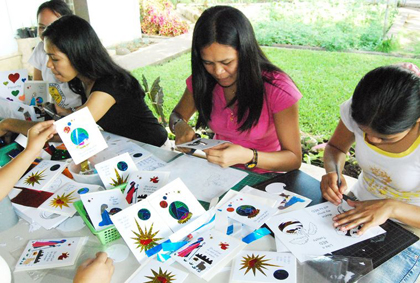
And I was so lucky because there was a door that opened to me, Subanen Crafts with Fr Vincent Busch, a Columban priest in Ozamiz City. I was so happy when I became one of the Subanen Crafts weavers because since I was a kid I dreamed of earning a degree and having a better future so that I could help my family and fellow Subanens
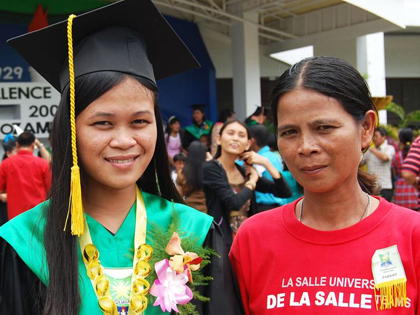
The project was able to send me to high school and college where I completed a two-year course, Associate in Office Administration (AOA), at La Salle University, Ozamiz City. Right after my graduation in March 2010 Subanen Crafts offered me an opportunity to work as the admin clerk.
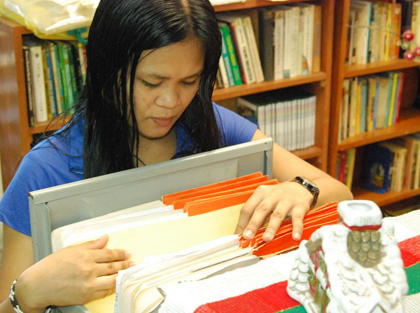
I’ve had so many lessons and experience in life: traveling to other places, meeting new friends, facing other people and getting to know myself better. This has helped me a lot to develop what I learned in school. Though I’ve already graduated with an AOA, I still want to do further study so that I can gain more knowledge and be more capable of doing the tasks I’m given and be able to help my fellow Subanens.
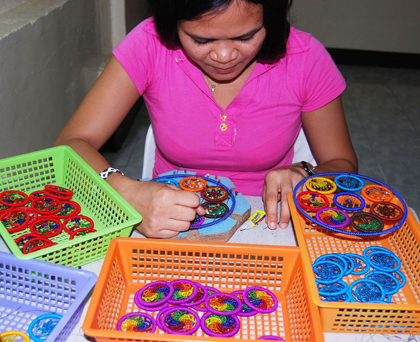
And I encourage all who are poor and my fellow Subanens to study. It really is true that ‘education is the only weapon’. It is the only key to success and to defend ourselves. It is also the only property and wealth that nobody can take and steal from us. Trust God completely and do not put yourself down . . . TO GOD BE THE GLORY.
You may email the author at mercy_gawason@yahoo.com
Street Children Locked Up
By Fr John A. Keenan
Fr Keenan, from Ireland, is chaplain at Centro Escolar University Manila.
 Maria dela Cruz, 15, and Lourdes Garcia, 16, (not their real names) were abducted one night near their homes and taken to a detention center near Manila City Hall because of ‘bagansa’, vagrancy, ie, being out during curfew. Instead of being taken home to their parents they were dumped into an already overcrowded, poorly ventilated detention center called ‘Reception and Action Center’ (RAC). Most children do not know what curfew is and anyhow they do not have watches or know how to observe the curfew hours. The plight of such children abducted from the streets was highlighted a couple of years ago in the local and international media. It is estimated that there are up to 20,000 children behind bars in the Philippines.
Maria dela Cruz, 15, and Lourdes Garcia, 16, (not their real names) were abducted one night near their homes and taken to a detention center near Manila City Hall because of ‘bagansa’, vagrancy, ie, being out during curfew. Instead of being taken home to their parents they were dumped into an already overcrowded, poorly ventilated detention center called ‘Reception and Action Center’ (RAC). Most children do not know what curfew is and anyhow they do not have watches or know how to observe the curfew hours. The plight of such children abducted from the streets was highlighted a couple of years ago in the local and international media. It is estimated that there are up to 20,000 children behind bars in the Philippines.
In RAC some 70 children aged between 1 and 16 years are packed into three rooms barely big enough for 30. They have to sleep on the bare wooden floors side by side like sardines in stifling heat and poor ventilation. This center is run by the City of Manila and the Department of Social Welfare and Development. The main problem is over-crowding, lack of sufficient food, of clothing, of adequate facilities, of privacy and of staff.
In another building in the same compound some 170 children in trouble with the law - petty crime, stealing cell-phones, ear-rings, cash, and some charged with serious bodily crimes are held in six 'dormitories'. This building is called 'Manila Youth Reception Center’ and is run by the same authorities as the RAC. Again the problem is over-crowding: lacking furniture, bedding, privacy, ventilation, adequate recreation, reading materials and so on. The children have to sleep packed together like sardines. For many it is a place without hope as their cases may go on for months or years due to lack legal representation and due process. As minors, according to law they are supposed to be released from behind bars after eight hours and turned over to the Department of Social Welfare and Development (DSWD) for re-education, counselling etc.
A third section called ‘Lingap’ houses in a large tent displaced families, the destitute, the sick and dying, mentally ill, the old and abandoned. It reminds me very much of the homes run by Blessed Mother Teresa's Missionaries of Charity. Again, they lack trained staff, privacy, medical supplies etc.
The children are abducted by local officials in the local barangay and by the police. The children who come mainly from poor and deprived families, have been abducted for simply begging, selling goods, being alone even in broad daylight or just sleeping. Instead of taking them home they are impounded, irrespective of their rights to know why they are being abducted, the right of their parents to know about it and their right to know where they are being taken by complete strangers. For them it is a terrifying and traumatic experience. According to RA 9344, Section 21 regarding the procedure for taking a child into custody the arresting officer must, among other things, explain to the child a) the offence committed, b) identify himself to the child, c) refrain from slapping . . . or using vulgar words, d) avoid displaying weapons or handcuffs. Their parents or guardians must also be informed.
To compound their trauma, they are herded into sub-human conditions, small children along with big teenagers in an atmosphere of fear and trepidation. Such crammed conditions can spawn all kinds of abuse, introduction to vice and fights among themselves. They are only allowed out for half an hour’s recreation and for their meals three times a day. The rest of the time they are cooped up inside in the stifling heat. They have no opportunity for study or improving themselves. Sometimes they may be there for over a month or longer before being released by being sent to Boys/Girlstown, a children’s home or to their parents or guardians if they can be found. The resident staff do their best to help them and succeed admirably in many cases, but they are hampered by numbers.
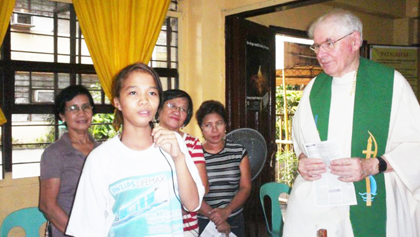
The fact is that most of them should not be there in the first place since they are innocents, the victims of poverty, broken families and neglect both in the city and in the provinces. Instead of being ‘rescued’ they are being condemned to sub-human conditions. It has been suggested that the barangay officials and police are being rewarded for filling their quota of arrests. The Center is understaffed, there are not enough social workers to pursue their cases and set them free. They have an impossible job because of the lack of financial and personnel support. RAC is probably one of the better detention centers as compared with similar institutions in other cities in Metro Manila and in the provinces. If the community became more aware and helped poor families, paid just wages and made genuinely free education a reality, many of these children would not end up in RAC.
I celebrate Mass in RAC every Sunday morning, which is much appreciated by the children and staff. Before Mass the volunteers give the children religious instruction and I usually meet them individually. This gives me a chance to get to know them and their background. They are lovely children. As Don Bosco used to say, 'There in no such thing as a bad boy or girl'. They are simply victims of poverty, broken families, abusive parents, lack of a decent home, water, electricity, food, education. I feel pity for them and angry at Society, Government and Church, that are not doing more to respond to these basic human needs. Most have dropped out of school by 10 or so due to lack of food, 'pamasahe' (fares for public transport), requirements in what is supposed to be a free education for all. What hope is there for them? Without education or a livelihood will they end up as prostitutes, criminals and be shot at sight by the agents of an unjust society? It is very sad indeed.
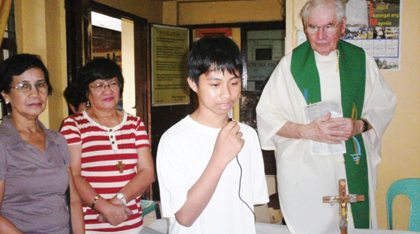
The RAC staff, who are social workers, are very committed to the welfare of the children and do their best to feed and take care of them on a slim budget, until they find their parents or guardians. I feel that my presence there gives them spiritual and moral support in what could easily be a very depressing job. They are very welcoming and accommodating. Our work there complements what they are trying to do in convincing the children to avoid 'barkadas' (groups of peers, in this context with a negative connotation), vices and to go back to school.
Even more important and worthwhile is my ministry in Lingap to the destitute, the abandoned, the old, sick and dying, the wounded, the mentally sick, the street families etc. It is a microcosm of human misery and inequality under the shadow of an ultra-modern, luxurious shopping mall and Manila City Hall.
You may email the author at johnakeenan@yahoo.com
To Search is To Find

What is the meaning of Lent?

Here Fr Tom O’Reilly, the Regional Director of the Columbans in Britain, offers some answers arising from an experience in Pakistan.
There's a crack in everything and the light gets in
Fr Tom O’Reilly
When I arrived at a small chapel on the outskirts of Gujranwala, Pakistan, to celebrate Mass on the first Sunday of Lent I was surprised to see the place was practically empty. Eventually, I was told that the people were assembled in the house of Rashid, a parishioner, to support him in the rigorous fast he had begun on Ash Wednesday.
On investigation, I found Rashid solemnly seated on a raised platform before his house and surrounded by many admirers. He had decided not to eat or drink anything from sunrise to sunset for the 40 days of Lent and thus to prove that Christians could 'out-fast' Muslims, whose fast lasted only 28 days in the month of Ramadan!
I was sorely tempted to quote the words of Jesus: 'When you fast, put oil on your head and wash your face, so that your fasting may be seen not by others but by your Father . . .' (Matt: 6:17-18). I realized, however, that what Rashid was doing was but an extreme expression of a mentality many of us share. We have grown up with the idea that Lent is a time for increased effort on our part – doing more penance, saying more prayers, giving more alms.
 We see Lent as a time to sort ourselves out and do some spiritual spring cleaning. There is some truth in this, but we often end up with the wrong perspective. We don't save ourselves, no matter how hard we try; the compassionate God saves us, without totting up our good deeds.
We see Lent as a time to sort ourselves out and do some spiritual spring cleaning. There is some truth in this, but we often end up with the wrong perspective. We don't save ourselves, no matter how hard we try; the compassionate God saves us, without totting up our good deeds.
During Lent the main focus has to go on what God is doing for us, rather than on what we are doing for God.
Listening once to a Muslim speak about the meaning of the Ramadan fast for him helped me to look on Lent and its practices in a new way. He said the physical hunger he feels in fasting turns his attention to the deep hunger and great need for God in his life. Penitential practices like fasting can get us in touch with our human fragility, vulnerability and brokenness which hunger for an experience of God's salvation. To disciples of St John the Baptist who wondered why Jesus was not emphasizing fasting like their master, He replied that fasting is to be an expression of longing for his saving presence when he is taken from his own (Matt: 9:15).
Out of our vulnerability we express our longing for God in prayer. 'As a deer yearns for running streams, so I yearn for you my God. I thirst for God, the living God . . .' (Psalm 42:1-2).
In coming to the spiritual well, however, we meet the Lord who first thirsts for us. To the Samaritan woman who came to the well, Jesus introduces himself as a thirsty person (Jn 4:7). His physical thirst symbolizes his deep desire to give her the water of authentic life. In the Catechism of the Catholic Church we read, 'Whether we realize it or not, prayer is the encounter of God's thirst with ours. God thirsts that we may thirst for him.'
God gifts us with the Spirit who 'helps us in our weakness' and 'intercedes for us with sighs too deep for words' (Rom 8:26). In being reminded that prayer is one of the traditional practices of Lent, I am conscious of my own feeble efforts in prayer. However, I find it helpful to recall that prayer is not something we do, but something God does in us. Our part is to tune into the ceaseless prayer of the Spirit in our hearts.
In our vulnerability we also offer ourselves to be channels of God's loving outreach to those who are most deprived and broken in our world. In today's harsh economic climate, people are understandably worried about keeping their job, paying their mortgage, protecting their pension, and securing the basic necessities of life.
However, the temptation is to adopt the mentality of 'every man for himself' and forget those who are most neglected in our world. To disciples worried about their day-to-day survival, Jesus spoke of giving alms and remitting debts as ways of making a heavenly investment which is rock solid (Lk 12:22-34). And the Lenten imperative of almsgiving calls us, not only to respond to urgent needs, but also to challenge the unjust systems which keep so many people in dehumanizing poverty and do irreparable damage to God's creation.
The liturgy refers to Lent as 'this great season of grace,' which is God's gift to us. It is the time when we open ourselves to experience God's salvation as pure gift. And God's point of entry into our lives is our vulnerability and brokenness. As Leonard Cohen sings, 'There's a crack in everything, that's how the light gets in.'
Fr Tom O’Reilly was in Pakistan for 10 years and is now the Columban UK Regional Director.
Leonard Cohen singing Anthem:
Anthem
The birds they sang
at the break of day
Start again
I heard them say
Don't dwell on what
has passed away
or what is yet to be.
Ah the wars they will
be fought again
The holy dove
She will be caught again
bought and sold
and bought again
the dove is never free.
Ring the bells that still can ring
Forget your perfect offering
There is a crack in everything
That's how the light gets in.
We asked for signs
the signs were sent:
the birth betrayed
the marriage spent
Yeah the widowhood
of every government --
signs for all to see.
I can't run no more
with that lawless crowd
while the killers in high places
say their prayers out loud.
But they've summoned, they've summoned up
a thundercloud
and they're going to hear from me.
Ring the bells that still can ring ...
You can add up the parts
but you won't have the sum
You can strike up the march,
there is no drum
Every heart, every heart
to love will come
but like a refugee.
Ring the bells that still can ring
Forget your perfect offering
There is a crack, a crack in everything
That's how the light gets in.
Ring the bells that still can ring
Forget your perfect offering
There is a crack, a crack in everything
That's how the light gets in.
That's how the light gets in.
That's how the light gets in.
Peace by Peace

|
|
||||
We have never preached violence, except the violence of love, which left Christ nailed to a cross, the violence that we must each do to ourselves to overcome our selfishness and such cruel inequalities among us. The violence we preach is not the violence of the sword, the violence of hatred. It is the violence of love, of brotherhood, the violence that wills to beat weapons into sickles for work.~ The Violence of Love, Oscar Arnulfo Romero, Archbishop and Martyr of San Salvador (1917 – 1980) ~ |
|||||
|
|||||
Peace demands the most heroic labor and the most difficult sacrifice. It demands greater heroism than war. It demands greater fidelity to the truth and a much more perfect purity of conscience.Thomas Merton, in religious life Father Louis OCSO, 1915-1968 ~ |
|||||
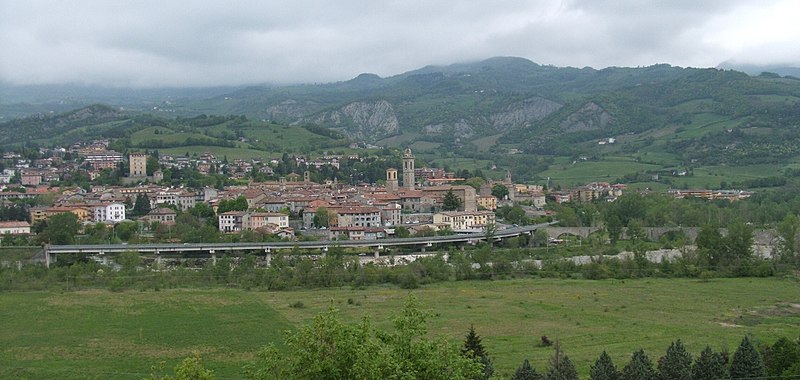
Under no trials let us fall,
by no sorrow let us be broken,
by no struggle worn out,
by no flattery diverted from our task.
May no trial, no tribulation,
no oppression, no hunger, no poverty
no death, nothing sad, nothing sweet, nothing unjust, nothing fair,
may none of the world’s vanities separate us from Christ
so that we may abide with him
forever and ever. Amen
~ St Columban (c.540 – 615) Sermon IV ~
Your Turn

Misyon Really Inspires Me!
By Maricar Garces
Misyon really inspires me.
I’m very sad to hear that you are no longer printing the magazine! I've been searching for you all over the internet and am very interested in being a member! I love reading stories from your Columban missionaries because they inspire me a lot! I feel that our Lord is beside me when I read these articles! I’ve kept a copy of the March-April 2002 issue of Misyon. Even though it’s not the latest, the stories refresh me each time I read them. It’s very inspiring.
Right now, I’m a happy mom . . . no, no let me correct that . . . I’m a super happy mom! My son is such a wonderful blessing even though he sometimes likes to bite on the magazine that I’ve been keeping for a long time now.
Sometimes I imagine if I could be a Columban missionary. That would surely be a wonderful experience in my life if ever. I really love to teach, to mingle with other people, especially those from different cultures. I know I could learn many things from them, in the same way that I learned so many things from people of different cultures, when I was still working in a hotel. That is what makes me love the Columban missionaries. They share their wonderful experiences that continue to inspire people.
Box
Misyon: www.misyononline.com
To go directly to our Online Forum click here.
You may also go directly to the forum from our homepage by clicking on Be one of Us on the right near the top.
You’ll find us in Facebook under the name Sharing Misyon, which includes a link to a separate page, Misyononline.com.
You may email us at editor@misyononline.com

 Only a great venture of faith, humility, and love can solve the problem of the fate of Christendom.
Only a great venture of faith, humility, and love can solve the problem of the fate of Christendom. It appears that the moment has come when we can no longer remain inactive without endangering the salvation of souls, and without banishing the intellectual strength which is bound up with it; it appears that by moving forward we can win many more souls.
It appears that the moment has come when we can no longer remain inactive without endangering the salvation of souls, and without banishing the intellectual strength which is bound up with it; it appears that by moving forward we can win many more souls.



